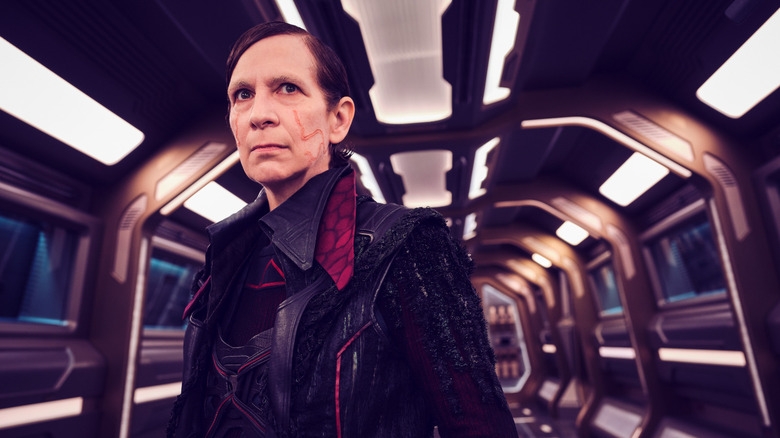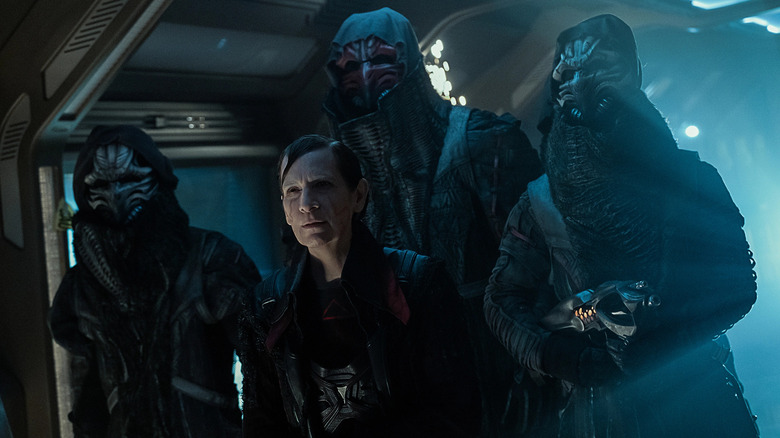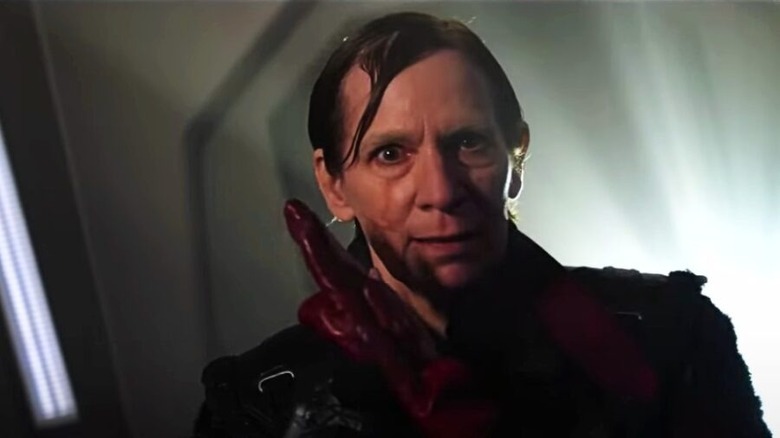Amanda Plummer's First Day As Star Trek: Picard's Vadic Had The Cast On Edge
This post contains spoilers through the seventh episode in season 3 of "Star Trek: Picard."
As of this writing, seven episodes of "Star Trek: Picard" have aired, and we've learned many secrets about the show's primary antagonist, Vadic (Amanda Plummer). Captaining a ship called the Shrike, Vadic has the ability to form weaponized portals in space and uses this technology to redirect enemy fire back at them. The Shrike can also fling entire starships using its overpowered tractor beam, and a lot of dialogue has been devoted to how well-armed it is. Vadic projects a slithery intensity when talking to her potential foes, and sports facial scars and the slicked-forward hairstyle of a proper supervillain. Vadic, however, becomes scared in private when talking to her Changeling commanding officer. Her villainous arrogance is merely a show.
We eventually learn that Vadic is also a Changeling. Following the Dominion War (a central event of "Star Trek: Deep Space Nine") she had been captured by a Federation scientist (also Plummer), who subjected her and several other Changelings (who ordinarily live in a liquid state) to horrible tortures and medical experiments. Vadic eventually revolted, took the form of her torturer, and set about on a quest for revenge.
While the "singular villain who wants revenge" is a too-tired trope of "Star Trek" (the feature films in particular), Plummer has been given the time and the leeway to establish just how scary and threatening Vadic is.
In a recent interview with TV Line, showrunner Terry Matalas pointed out that Plummer's performance was something of a question mark, at least at first. It seems that Plummer was busy shooting another TV series, so she was unavailable for rehearsals. No one knew what kind of performance she was going to give until she was already on set. This left everyone, including her co-stars, uneasy.
Acting to a blank screen
Terry Matalas may have been a little scared, but he was resolute in casting Amanda Plummer. He admitted he has been a fan of hers for many years, stemming from when he saw her in several of her more notable 1990s feature films as well as one of her more famous stage performances. He wrote the role with the actor in mind, and Matalas felt he tailored the part well. The showrunner said:
"I have always had this fascination with Amanda Plummer. I mean, going back to her winning the Tony for 'Agnes of God,' to 'The Fisher King' to 'Pulp Fiction' to 'The Prophecy' ... I just loved her. There were two actors that we wrote for: One was Amanda Plummer. The other was Todd Stashwick, who plays Shaw, who I've worked with before on '12 Monkeys.' There was never anyone else ever envisioned in those roles besides those two people, and the value of that is you get to write towards their strengths."
But, that didn't mean everything went as smoothly as Matalas would have liked. He pointed out that Plummer was so busy, that her appearance became a last-minute proposition. A lot of "Picard" had to be shot before her actual arrival on set, leaving many actors talking to a blank viewscreen to be filled in later. Luckily, when the time came, Plummer brought the villainy. Matalas said:
"Amanda was shooting another show, 'Ratched,' so she came in after we had already shot the majority of episodes 1 through 5. So we didn't know who was going to appear on the viewscreen. By the first rehearsal, we were all holding our breath, and [when] she gave that performance, people were hugging each other, people were congratulating each other. We were so thrilled to have a classic, larger-than-life 'Star Trek' villain."
Villainy?
"Star Trek," of course, often gets a lot of traction by being more morally nuanced than a "hero/villain" dynamic would allow. There are plenty of scary, cruel, and destructive characters throughout the franchise, but most of them are depicted as fully realized people with motivations and belief sets that stand counter to our own. Villainy is an exciting dramatic tool, but it doesn't have much of a place in the usually staid, diplomatic world of "Star Trek."
Terry Matalas wanted to address this by saying that Vadic did indeed have her motivations, having been filled with justified wrath over being a tortured prisoner of war. In Matalas' words, she "has her own story and reasons to sympathize with her as well. [...] She has very personal reasons, but she also answers to a higher power, let's just say."
Matalas was also comfortable with Vadic's behavior on "Picard," as she links up to the established canon. As a Changeling, Trekkies will be able to understand her motivations better than if she were in it for novel reasons. Fans of "Deep Space Nine" will have many years of backstory to draw on as well as a new mystery to solve: Why did the Changelings come out of hiding, what is their plan, and how deep does the conspiracy run?
Three episodes of "Picard" remain. The answers to these questions are forthcoming.


